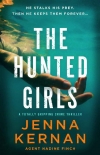The Hunted Girls, Jenna Kernan [children's books read aloud TXT] 📗

- Author: Jenna Kernan
Book online «The Hunted Girls, Jenna Kernan [children's books read aloud TXT] 📗». Author Jenna Kernan
His hand went to his napkin and then to her knee. The zip of attraction sparked, and she met his gaze. There was no misinterpreting that look. Nadine’s pulse jumped as she returned his smile.
“Can I come up to your room tonight?”
“You’re the one with the king-sized bed.”
“Great. You come to my room.” He grinned. “See you later then.”
Juliette and Tina returned as they reached the servers’ station. Tina’s face had gone pale and she was sweating.
Nadine recalled that Tina’s mother’s victim had been found in a shallow grave. The prospect of seeing this body dump might be touching off all sorts of emotional reactions.
“You okay, Tina?” asked Nadine.
Tina pressed her mouth tight and gave a vigorous nod.
“We can swing by the hotel. Drop you off.”
“No you won’t! I’m going, too.”
“Not necessary,” said Demko.
“I’m part of this team,” she said, her expression stubborn.
Demko sighed and motioned toward the door. When they reached the exit, their hostess cast them a ready smile.
“You folks have a good meal?”
“Yes, very good,” said Demko.
“That’s fine! Y’all come back and see us.”
Their affable hostess wished them a great evening and waved them out.
Ten minutes later, they had left Ocala behind and headed, in Demko’s SUV, toward the St. Johns River, leaving streetlights behind.
On the way, Juliette told them everything she could remember about Rita Karnowski.
“She enjoyed the outdoors. She and her boyfriend… oh, what’s his name?”
“Hugo Betters,” supplied Demko.
“Right. Kayaked on Saturday morning.”
“Big Water Marina,” said Demko.
“Then you tell it,” said Juliette.
Clearly, he knew every missing person’s case better than any of them. Nadine recalled the name, but she’d need the files to refresh her memory.
“After eating at Big River on Saturday, March 20th, they headed to a hiking trail. Hoping to see some wildlife. She’s a transplant from up north.”
“Michigan,” said Juliette.
“Yes. Very interested in the spring migration.”
“You got this all from her file?” asked Nadine.
“I’ve spoken by phone to her parents,” said Demko.
“When?”
“This morning.”
Skogen was not going to like that, she thought.
“Before the ID?”
He nodded.
“You speak to the boyfriend?” she asked.
“Not yet.”
“Because…”
“Until Skogen clears him, he’s likely to be a suspect.”
“What about Nikki Darnell’s husband?” asked Juliette. “What did you think of him?”
“There’s a big range of emotional reactions when confronting the death of a loved one. But his seemed rehearsed.”
Demko took up the conversation again. “And her father has indicated there is insurance money. Ask Skogen to see if her husband also has a policy on his wife. Request Darnell’s computers and check what he’s been searching on the internet. If he and his wife used the same one, it will be part of the investigation.”
“You think these two each killed their partner,” asked Tina.
“I think,” said Demko, “that you look at partners until you know otherwise.”
Nadine thought of his mother, who hatched a scheme to kill her second husband for insurance money, dragging her elder son into a murder plot that landed them both in federal prison.
In the darkness, the bleached asphalt glowed gray in the headlights. Deep drainage ditches flanked them. These would fill in the summer rainy season, making an easy highway for the male gators seeking new territory.
The silence in the vehicle closed in on Nadine.
“Juliette, I want to ask a favor. Would you take a blood sample and run it for a specific enzyme sequence?”
“Sure. I order lab work all the time. Whose blood?”
“Mine.”
The silence now crackled.
“If it’s to add your blood to the DNA database, I’d advise against that,” said Demko.
“Not for that.”
“Research?” Juliette asked, her words holding caution.
“Personal reasons.”
“What am I looking for?” asked Juliette.
Demko broke in. “Nadine, is this about that damned study?”
“What study?” asked Tina.
“Some doctor drew blood from felons and now Nadine is fixed on it,” said Demko.
“Is this the gene sequence associated with greater frequency of violence?” asked Juliette, clearly recalling a conversation Nadine and she had had months ago.
“Yes. I want to know if I have the sequences associated with aggression.”
“Why?” asked Tina.
“Because the sequence shows a strong correlation to violent behaviors, like homicide.”
“You are not going to become a killer because you have some gene sequence,” said Juliette.
“My great-grandfather, grandfather, my mother, and my brother all committed acts of—”
Demko cut her off. “All made their own decisions and suffered the consequences.”
She said nothing to that.
“What about the rest of us?” he asked. “Do you think we’re all killers because of our parents’ crimes?”
“No, of course not.”
“One study,” said Juliette. “You can’t explain criminality purely as biological. There are other factors. Ones that won’t appear in the blood, genetics or the small research study you’ve fixed on.”
“I realize that.”
“Do you? Violence is not that simple. Scientists have been trying to attribute man’s evil deeds to brain damage, genetics, hormonal abnormalities and, in past centuries, to the lumps on a person’s head. I saw one bizarre argument linking crime to fluoride in drinking water.”
“Really?” asked Tina.
“It’s like trying to find the cause of cancer. PS, there isn’t one. There are many contributing factors, a mix of heritage and environment. So don’t place too much value on one study.”
“Using your analogy, it’s like a cancer screening,” said Nadine. “Just something to be aware of.”
“You are not like them. You’re a profiler,” said Demko. “You hunt killers.”
Killers like her mother.
“Nadine, you are what you do. Not what you fear you’ll do. Not what your mom did,” he said. “And I know you. You’re all about stopping these monsters. Not becoming one.”
Monsters. That’s what he thought of her mom. What everyone thought. And she was. But Arleen was also her family.
Confronting the Copycat Killer had shown her that she wasn’t like her. But Nadine now had other worries. Ones that replaced her old obsession of the possibility of becoming a violent offender and ending up in a jail cell beside her mother. Over the last year, she battled a new apprehension, one triggered by Clint’s desire to get more serious.
What if the killing just skipped a generation?
“Besides, you’re almost thirty, and you’ve never committed a violent act,” he said.
“I stabbed the Copycat Killer.”
“In self-defense,”





Comments (0)